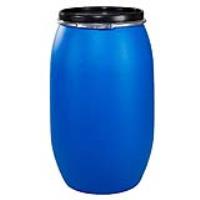 Add My Company
Add My Company
Sign In

Plastic drums are one of the most versatile pieces of industrial storage and transport equipment found in a warehouse.
Ordinarily coloured blue and spherical in shape, they can vary in size and overall capacity. They’re suitable for storing a wide range of materials, from foodstuffs through to hazardous chemicals.
In this article, we look at which substances you can safely store in a plastic drum.
WHAT IS A PLASTIC DRUM?
A plastic drum is a spherical barrel moulded from industrial-grade plastic. They’re commonly coloured blue for easy identification, and are designed for storage and/or transport of industrial goods.
Plastic drums are produced from a material known as HDPE, which stands for High-Density Polyethylene. It’s an incredibly malleable, yet rigid material that can withstand high temperatures and many hazardous chemicals.
Drums are produced in a wide range of sizes, which allows them to meet different industrial needs on both a small and large scale. Plastic drums generally range in size from small 30-litre barrels up to large 220-litre barrels.
Smaller plastic drums have black handles on the side, allowing them to be moved and lifted by hand. Larger plastic drums can be easily moved using forklifts.
There are two primary types of plastic drums used for industrial packaging. These are known as open head or tight head plastic drums.
OPEN HEAD PLASTIC DRUMS
Open head plastic drums have a removable lid on the top end of the barrel. This lid makes it easy to pour contents into the drum and to remove them again later.
Open head plastic drums are sealed shut using steel clamps, or can be left in storage with no lid attached and the contents open.
TIGHT HEAD PLASTIC DRUMS
Tight head plastic drums are similar to closed head drums in many ways. The main difference is that tight head plastic drums are sealed on both ends. There is no removable lid.
Instead, tight head drums are filled or emptied using a nozzle or bung. So although it’s more difficult to fill a tight head barrel up, it’s much more secure.
WHAT CAN YOU STORE IN A PLASTIC DRUM?
Plastic drums can be used to store a wide array of different industrial goods. The most common include the following:
Chemicals
Solvents
Pharmaceuticals
Liquids
Oils and lubricants
Grains
Food ingredients
Sand
Their versatility and durability ensure that plastic drums are popular for both storage and transport. Because they are available in a range of sizes, they can be also used in an industrial capacity.
Plastic drums are reusable, but you need to ensure that they’re cleaned out before and after each use if you are going to be storing different goods in them. It’s not a good idea to cross-contaminate, so don’t attempt to store food in a plastic drum that was previously used to store chemicals.
You can stop contamination by making use of drum liners. These are available in a range of sizes and for particular uses, and will help to store materials without the plastic sides being touched or contaminated in any way.
Plastic drums can be used to store both foodstuffs and hazardous chemicals. You need to check though that your plastic drum is designed and tested to withstand certain chemicals or to be suitable for storing food in the long term.
WHAT CHEMICALS CAN YOU STORE IN A PLASTIC DRUM?
Plastic drums are often used to store chemicals. The material that the drums are made of (HDPE) is UN approved for storing chemicals.
Plastic drums must be clearly identified if you’re using them for hazardous chemicals, and you must carry out rigorous health and safety checks to ensure that you’re correctly storing and transporting industrial chemicals or hazardous substances.
You should also check the general state of the plastic drum before attempting to store dangerous materials inside. If the plastic drum doesn’t look fit for service or has too much wear and tear, don’t risk it.
Risk management is essential, and your plastic drums will need to form part of this assessment.
CAN YOU USE A PLASTIC DRUM TO STORE FOOD?
Plastic drums are commonly used to store food, beverages, and ingredients. They can be used to store large quantities in bulk, but you need to check that your plastic drum is certified as food grade.
Food grade certified plastic drums are specifically built to store foodstuffs for an extended period of time. Being certified as food grade means the plastic doesn’t contain any harmful chemicals or dyes that could otherwise leach into the food.
If you are unsure whether your plastic drum is food grade quality don’t use it for storing consumables, as this could potentially cause harm further down the line. There’s a difference between plastic drums marked food safe and those marked food grade. Food safe barrels might not be suitable for long-term storage of consumable goods.
Plastic drums of food grade quality can be used to store a wide range of foodstuffs in bulk quantities. They are commonly used to store cooking oils, cooking ingredients, spices, beverages, or powdered goods such as gravy granules or ground coffee.
WHAT SUBSTANCES SHOULDN’T YOU STORE IN A PLASTIC DRUM?
There’s little that you can’t store in a plastic drum. The most important aspect of storage is ensuring that you don’t cross-contaminate by using the same barrel for different purposes.
Always ensure that you meet health and safety stipulations and that you store your goods using the correct procedures.
CONTACT ITP PACKAGING TODAY
ITP Packaging offers a wide range of plastic drums, suitable for industrial and food use. Our friendly team is here to help you make the best purchase for your business needs.
For more information about our plastic drums, please telephone 0333 987 4565, email sales@itppackaging.com, or complete our online contact form and we will be in touch as soon as possible.
For more information on What substances can you store in a plastic drum? talk to ITP Packaging Ltd
Enquire Now
List your company on FindTheNeedle.

